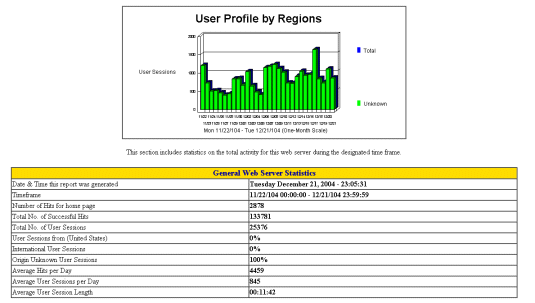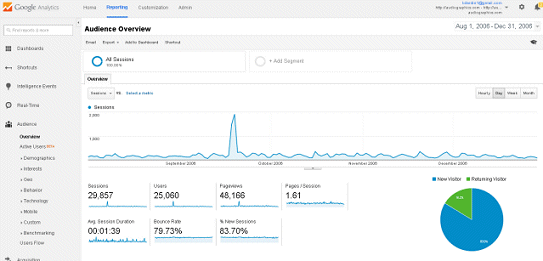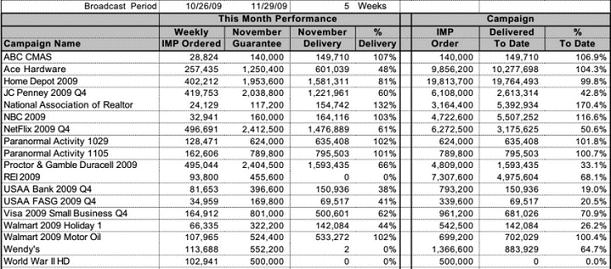| Wednesday, November 12, 2014 |  |
 |
 |
|
Hear Today's Songs |
 |
 
 
 |
 |


 A New Breed of Indie Artists
A New Breed of Indie Artists Free Music and Programs for Radio and Podasters
Free Music and Programs for Radio and PodastersBig Data Big Buzzword
|
If I read about "Big Data" one more time, the computer gets turned off. A dozen years ago we were speaking about landing pages, revenue-per-visitor, and search engine optimization - all of which relied on data to be effective. There was a lot of data, but we never called it "big." |
"Buzzwords are for the uninformed. Those who do the work decided long ago to let the numbers do all the talking." |
Over a decade ago, Webtrends reports were standard.

In 2005, a company called Urchin Software Corp. came along and was bought by Google; this morphed into Google Analytics. A new discipline of using data to improve advertising and programming was born.

Back then we were reading large numbers of visits, calculating new ways of interpreting that data, and creating tables with charts to help management make informed decisions.

It was analytics, the same type of analysis of data occurring today. Except, someone threw the term "Big Data" on the action, and now anyone who doesn't understand what it requires calls it that buzzword.
Here's another buzzword, "programmatic buying." Six months ago you'd rarely see a radio industry trade mention it. Today it's thrown about as if there's a system in place.
Just so we're clear: Buying online advertising is growing; so is buying advertising via programmatic buying. The latter, though, represents a small sliver of total online ad buys.
Yet, we see the term programmatic buying being thrown around in radio plenty. It's used in a "we will do that" term, not as "we do that." And this brings us to the crux of the problem in radio: Radio uses buzzwords without creating what the buzzword means.
The solution: Quit talking about what you are going to do. Demonstrate what is being done.
Jeff Haley of Marketron is now saying he has 1,500 stations ready to do programmatic buying. Nobody is interested because, again, Mr. Haley talks about what radio is going to do. (That his company revolves around data may also play into this, but that's conjecture.)
Think LMiV, HD Radio, Radio Communicators Group, Radio 2020, Radio Heard Here, The HD Radio Alliance, Radio. You Hear It Here First, Less is More... I can go on. Every one of these were concepts the radio industry boasted with to show it was going to change the landscape. They were all radio's inside buzzwords, and they all failed.
I suggest that programmatic buying is a big part of online ad buys, but they are in a sector so far removed from what radio offers, online, that to draw the two together is problematic; 53% comes from online display ad buys. The forecast in this MediaPost article is that "By 2017, it projects that programmatic buying will account for 87% of display, 69% of video and 88% of mobile advertising buys." Strata adds this.
Yet, most of radio is still selling online impressions of banners (with no tracking for ROI).
Look back when RAB had Jeff Haley as its CEO, and what was accomplished? In 2011 he reported in opening remarks at NAB's The Radio Show: "Today mobile means a lot more because of the explosion newer technology that sometimes confuses the issue as to who invented this technology - we did." Can any statement be farther from the truth? Radio has always been mobile, but it did not invent mobile technology.
Let's also visit another of Jeff Haley's comments from January of this year: "...Iím convinced that the top media start-up sector in 2014 is, believe it or not, radio."
Remember Google's "AdSense for Audio"? It introduced the radio industry to programmatic buying around 2007. (We may not have called it programmatic buying then, but we weren't using "Big Data" at that time either.) Radio turned its back on Google. Radio will turn its back on today's offering by Jeff Haley in the same way. The first time was a mistake. This time it will be for the betterment of radio.
As far back as 2005, a now-defunct TargetCast was warning, "Buy-siders indicate significant concern with radio's current audience measurement credibility." Did anyone in radio react?

The main hurdle isn't a new center stack in vehicles, designed to make AM/FM harder to access. It's not radio's insistence to sell impressions when young media buyers are purchasing ROI. Radio's lackluster performance in social media and its web sites don't even matter anymore.
The biggest hurdle for radio is that it's an industry of words; operating in a technological world where innovation means producing something and then talking about it.
Think of how many times we've seen technology companies improve what they are serving online. Tech goes through versions of platforms. Radio goes through throwing another idea out, talking it up, then throwing out another idea.
Buzzwords are for the uninformed. Those who do the work decided long ago to let the numbers do the talking. Concentrate on improving the user experience and growth takes care of itself.
Tech analytics talent read data and inform management, silently. They are the ones who will lead everyone into tomorrow. Radio will continue selling by CPM and sending out paper invoices, while boasting how digital it's become.
More Articles
Today's indie introduction is to...
| Rap Rock artist BrothersP |
 sample song |
Where Are the Kings Download Song
|
Give BrothersP's "Where Are the Kings" a listen.
Add it to your playlist, free!
 |
 |
 |
comments by Disqus |



